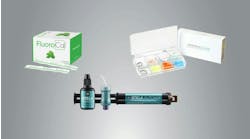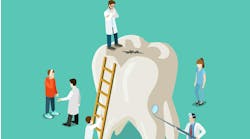There are over 49 million people with Medicare in this country. There are approximately 249 million people with medical insurance. Through the Affordable Care Act, millions more are signing up for medical insurance. This represents many more patients than have dental insurance. So let me ask a very simple question -- why doesn't your dental office learn to bill medical insurance?
This is by far the biggest missed opportunity in dentistry. This has been available to dental professionals for quite some time, and I would say that most of you reading this have never realized how this can positively impact your practice. By the way, this opportunity is by far the most effective driver of new patients to your office. It doesn't cost you a penny; in fact, it pays you.
RELATED | Case acceptance in an insurance-driven world
Most of you are probably thinking that medical insurance and Medicare don't pay dentists, and besides, your physician friends consider medical insurance a real hassle. In fact, there are a number of dental services that do qualify for medical insurance benefits. You're right; while medical insurance can be a challenge for physicians, they could not live without it because it drives the health-care system. Medical insurance reimburses dental professionals on specific areas of treatment that are typically well defined. There are certain diagnosis and treatment protocols that serve as the basis for claim submission and reimbursement. Once you're trained in what those are, and you develop proper documentation procedures and a streamlined system for billing medical insurance, the entire process can be easier than billing dental insurance.
There is a strategy for developing relationships with medical insurance providers in your area, as well as a technique for knowing what to bill medical insurance in order to gain recognition as a dental provider. Let me give you a perfect example of this. Right now, nearly every medical insurance and Medicare will pay dentists for oral appliances that treat bruxism, TMJ/orofacial pain, and obstructive sleep apnea. The protocol for these oral appliances are well defined in terms of the diagnostic criteria needed for a patient to qualify for reimbursement. In addition, there is a credentialing and enrollment process to go through with the medical insurances in your area to be recognized as an established dental provider.
Most dentists have the typical "tunnel vision" when they evaluate whether or not to accept medical insurance and Medicare. Some dentists look at this and think if they can only bill for certain treatments, it isn't worth it. In my opinion, that is incredibly shortsighted. Here is how I look at it -- patients are coming to your office because they know that you accept Medicare. They have no idea what dental services are or are not covered by Medicare. Nearly every patient over 65 has Medicare, many are already in your office, and I would bet that a number of them have bruxism and obstructive sleep apnea issues.
If you know the Medicare billing process, this results in instant production just by finding out who these patients are in your office, and by learning how to make oral appliances that treat bruxism and obstructive sleep apnea. Medicare patients also need many other dental services, whether they are implants, crowns, bridges, restorative, or dentures. Accepting Medicare and medical insurance is not just about being able to get paid for one service. It is about getting millions of patients to your dental offices that need a lot of dentistry.
There are dentists who now bill medical insurance in every American Academy of Facial Esthetics (AAFE) course we teach. Learn the process of medical insurance, which includes enrolling with the major medical insurances, knowing how to document like a physician, what medical insurance does and does not pay for, and the right strategy for how to start billing medical insurance so that you are recognized as a trusted provider of these services. Because dental sleep medicine, TMJ/orofacial pain, and bruxism are the top dental services recognized by major medical and Medicare, get trained in these areas and begin billing medical insurance.
Past DE Articles







